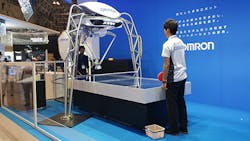CHIBA, Japan — A Japanese inventor is hoping a robot that still needs humans will win over Asia’s largest tech fair, offering a counterpoint to major technology firms pushing the boundaries of artificial intelligence.
Katsumori Sakakibara was showing off his little droid called Caiba at the Cutting-Edge IT & Electronics Comprehensive Exhibition (CEATEC), which kicked off Tuesday near Tokyo. Waist-high Caiba — whose name means hippocampus, a key area of the brain, in Japanese — is controlled by a human wearing a virtual reality handset and mechanical arms. If the person waves their arms, the little robot follows suit. But whatever Caiba does, it depends on a human to control it.
“People say what an amazing AI we’re using for the robot. So I tell them, ‘Well, it’s actually a middle-aged guy’,” Sakakibara told AFP during a press preview this week. “Humans are more flexible in that they can recognize a huge amount of different information, but so far AI can only be used in limited situations” such as playing chess. “We thought it would be better to use humans instead of AI.”
Google, Apple, Facebook and Microsoft are among a growing number of technology firms that have been investing in making machines smarter, contending the goal is to improve lives through artificial intelligence. Some critics, however, have warned that AI could turn on humanity and be its ruin instead of a salvation.
Less risky to the future of humanity was a robot arm made by automation parts maker Omron that can play -- and coach -- humans at ping pong.
The machine is now a Guinness World Record holder as the first robot table tennis tutor, according to the company.
“It can now understand if a player is a beginner or experienced and change how it plays,” said Omron’s Taku Oya, referring to the robot’s AI capabilities. It can even give a compliment or two in text that appears on a screen beside the ping pong table. “A perfect serve!” it says, or apologizes for missing a ball.
“But its AI is not good enough so that it could beat professional table tennis players,” Oya warned.
Meanwhile, Sharp is taking aim at the housing market with pint-sized Rin-chan, which can operate home appliances based on its owners’ feelings. For example, if a house dweller says ‘it’s too hot’, the robot will turn on the air conditioning.
Another star of the show is a mug-sized, doe-eyed robot called Kirobo Mini made by Toyota as a chatty companion for its human owners. The four-inch-tall robot will go on sale next year in Japan for about $400.
Meanwhile, Sakakibara hopes his little firm’s AI-free droid could be used as a translator or guide at airports and other tourist spots.
“This way, translators don’t have to run around — they can just sit at a central office and connect with the robots,” he said. “It’s a more efficient use of manpower.”
By Natsuko Fukue
Copyright Agence France-Presse, 2016
About the Author
Agence France-Presse
Copyright Agence France-Presse, 2002-2025. AFP text, photos, graphics and logos shall not be reproduced, published, broadcast, rewritten for broadcast or publication or redistributed directly or indirectly in any medium. AFP shall not be held liable for any delays, inaccuracies, errors or omissions in any AFP content, or for any actions taken in consequence.
